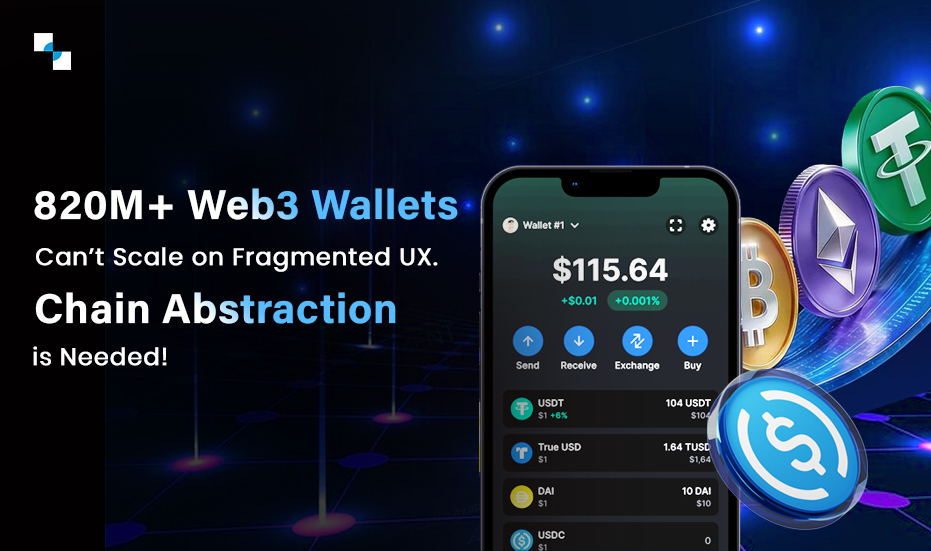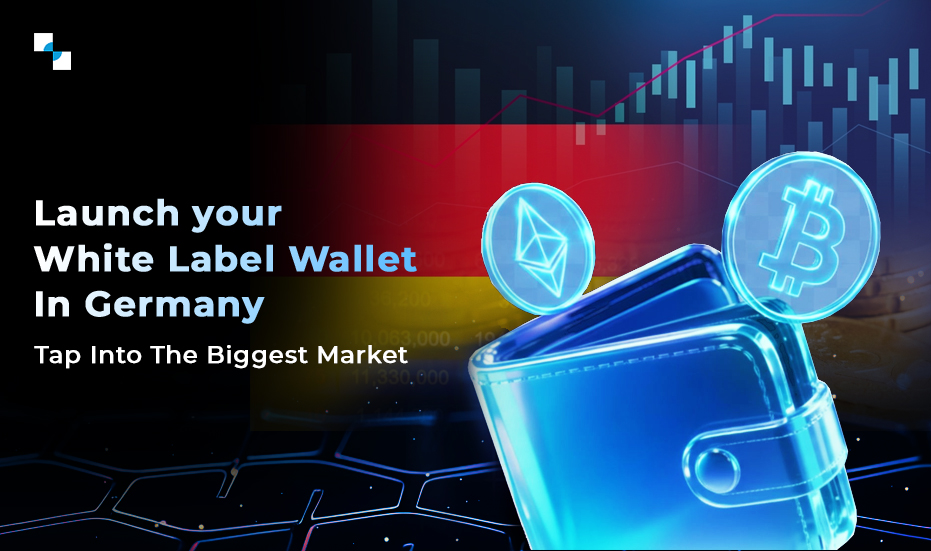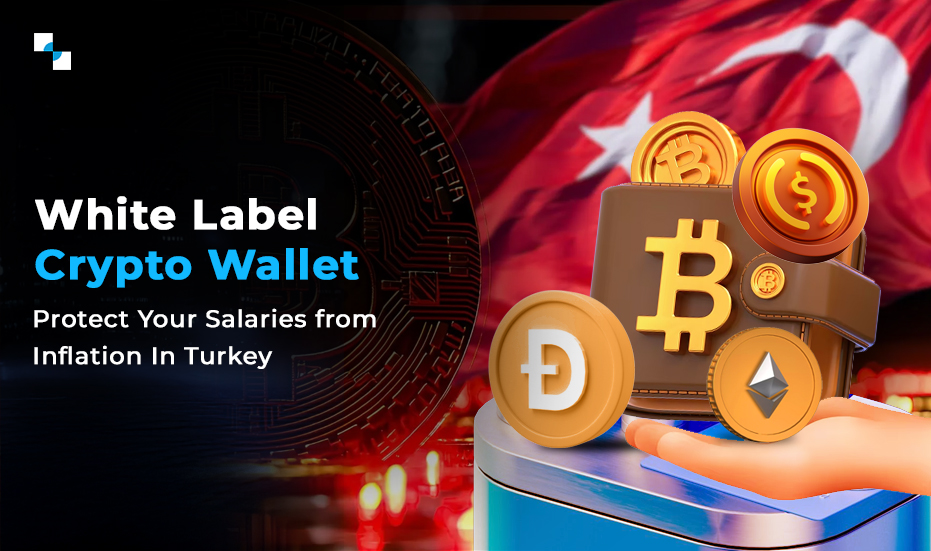The white-label cryptocurrency wallet sector is at an inflection point. As enterprises and investors seek rapid go-to-market strategies in Web3, white-label crypto wallets provide a turnkey path to launch branded, secure, and compliant digital asset platforms. In 2024, the white‑label cryptocurrency wallet market was valued at US$179 million and is projected to reach US$295 million by 2031, growing at a CAGR of 7.4% from 2025 to 2031.

Meanwhile, the broader crypto wallet development market is expected to expand too. This growth highlights the increasing demand for white-label crypto wallet services among startups, enterprises, financial institutions, governments, banks, and NFT marketplaces alike.
Below is a curated Q&A addressing the top 20 white-label crypto wallet development questions; each answer answers all the queries of an investor or business that is planning to launch a solution soon!
Accurate Answers: Top 21 White Label Crypto Wallet Questions Every Investor Asks!
Q1. How does white-label crypto wallet development differ from custom-built crypto wallet development?
While a bespoke cryptocurrency wallet development initiative demands extensive R&D, proprietary codebases, and prolonged security validation, White Label Crypto Wallet Development delivers a battle-tested architecture that can be rebranded and configured. This approach reduces development timelines by up to 60%, lowers engineering overhead by 40–50% and incorporates pre-integrated compliance modules.

Q2. Why do businesses prefer white-label cryptocurrency wallet services over ground-up crypto wallet builds?
Enterprises prioritize rapid market entry and predictable budgets. With white-label cryptocurrency wallet services, organizations can:
- Deploy MVPs within weeks instead of quarters
- Leverage built-in KYC/AML workflows and audit reports
- Allocate capital to growth and user acquisition rather than core development
Q3. Who retains custody of private keys in a white-label crypto wallet setup?
A leading white-label crypto wallet service provider offers both non-custodial and custodial frameworks. Non-custodial models empower users with on-device key management—ideal for decentralized user experiences. Custodial frameworks place key management within the White Label Crypto Wallet Company’s infrastructure, facilitating institutional-grade recovery processes.
Q4. How much does white-label wallet development cost?
Investing in white-label crypto wallet development can be structured to match your strategic goals:
- Entry-Level White Label Wallet Development – Includes a core cryptocurrency wallet development framework (send/receive, balance display), standard security protocols, basic KYC/AML integration, and simple theming. Ideal for startups testing market demand and MVP launches.
- Mid-Range White Label Wallet Development – Builds on the entry-level package with multi-chain support (Ethereum, BNB), in-app swaps via DEX aggregators, advanced analytics dashboard, and enhanced UI/UX customization. Suited for growing businesses focused on user engagement and retention.
- Enterprise-Grade White Label Wallet Solutions – Offers full-featured white label crypto wallet services, including DeFi and NFT modules, hardware wallet integration, high-availability infrastructure, custom smart-contract deployment, and dedicated support SLAs. This tier is engineered for established financial institutions and large-scale ventures aiming for market leadership.
Q5. Which features should a high-performance white-label crypto wallet include by default?
A competitive white-label cryptocurrency wallet must offer:
- Cryptocard integration
- AI-Integration
- Stablecoin Integration
- Multi-chain asset support (Ethereum, BNB, Polygon)
- In-app swaps and DEX aggregation
- Multilingual facilitation
- Native NFT management and staking dashboards
- Biometric authentication and multi-signature transactions
- Admin console for compliance and analytics
Are you willing to acquire all the aforementioned features in your wallet solution? Antier holds all the capabilities required.
Click on the link below to read more :- Top 10 White-Label Wallet App Trends to Explore in 2025
Q6. How flexible is UI, token, and module customization in white-label crypto wallet development?
Top-tier white label crypto wallet development platforms provide:
- Theming toolkits for logos, fonts, and color schemes
- Plugin architecture to enable/disable DeFi, NFT, fiat on-ramps
- APIs/SDKs for proprietary smart-contract integrations
Q7. How much time does white-label crypto wallet development take?
Deployment estimates by complexity :
- MVP Wallet (basic send/receive): 2–4 weeks
- Feature-rich White Label Wallet Development (multi-chain, swaps, staking): 8–12 weeks
Connect with the industry’s most talented and certified experts! Antier typically takes 2-3 weeks to develop a white-label cryptocurrency wallet, helping businesses launch faster and smoother than their competitors.
Q8. Does a white-label crypto wallet platform support multi-chain and cross-chain transfers?
Yes—robust white-label crypto wallet solutions integrate :
- Cross-chain bridges and wrapped-token protocols
- Layer-2 networks (Arbitrum, Polygon)
- Atomic swap mechanisms for direct token exchanges
Q9. How secure are white-label crypto wallet development audits and certifications?
Security pillars for any cryptocurrency wallet development company should include
1. Third-party audits (CertiK, Quantstamp)
2. MPC-based key management solutions
3. Continuous penetration testing and SOC 2 compliance
Q10. Can I embed proprietary tokens, staking protocols, or liquidity engines in my white-label wallet?
Absolutely. Modular integration capabilities allow you to:
- List custom ERC-20/ERC-721 tokens
- Embed yield-generation smart contracts
- Integrate bespoke liquidity pools or DEX engines
Q11. What built-in global compliance frameworks come with white-label crypto wallet development?
For any business planning to launch a digital wallet in a regulated environment, compliance is non-negotiable. Fortunately, most enterprise-grade white-label crypto wallet development kits come with integrated global compliance measures, eliminating the need for costly post-launch retrofitting.
Key compliance modules typically include :
- GDPR readiness for handling personal data in the European Union
- MiCA compatibility to support EU crypto regulatory frameworks
- FATF Travel Rule integration to enable compliant cross-border transfers
- Geo-fencing tools that block wallet usage in restricted countries
- KYC/AML workflows that work seamlessly with Tier-1 identity providers
With these measures pre-installed, you can focus on scaling while your white-label crypto wallet stays aligned with global regulatory standards. Hire a firm that follows all regulatory standards and develops a wallet that fits the market standard.
Q12. How comprehensive is the KYC/AML functionality in a white-label crypto wallet?
Standard offerings integrate with Tier 1 identity providers, enabling :-
- On-chain transaction monitoring
- PEP/Sanction screening and automated reporting
- Customizable risk scoring thresholds
Q13. Can the wallet platform integrate with existing fintech or banking infrastructure?
Yes, most modern white-label crypto wallet solutions are designed with API-first architecture, enabling smooth integration with core banking systems, payment gateways, KYC providers, and fiat ramps. This ensures interoperability with existing fintech stacks—whether you’re connecting to legacy systems or next-gen neobanks, making the wallet an ideal bridge between traditional finance and Web3 ecosystems.
Q14. Are hardware wallets and Web3 login methods supported in white-label wallets?
Yes—typical integrations include :
- WalletConnect and Web3Auth for seamless dApp access
- Ledger and Trezor SDK compatibility for secure key signing

Q15. How can I monetize my white-label crypto wallet to maximize ROI?
Monetization via white-label crypto wallet development is driven by diverse, scalable revenue models. Businesses can earn through-
- Premium features (staking tiers, NFT drops)
- Transaction and swap fees
- White-label licensing or shared-revenue partnerships
- Embedded lending and financial products
Each channel aligns with high-growth user engagement while directly contributing to long-term ROI.
Q16. Is cross-platform deployment (iOS, Android, Web) standard with white-label solutions?
Leading cryptocurrency wallet development solution providers deliver :
- React Native or Flutter mobile applications
- Progressive Web App (PWA) for browser access
- CI/CD pipelines for automated updates
Q17. How scalable is a white-label crypto wallet for multi-million user onboarding?
Scalability is one of the strongest value propositions of modern white-label crypto wallet development. These platforms are designed with horizontally scalable microservices, cloud-native infrastructure (like AWS/GCP), and load-balanced APIs, allowing seamless performance even under multi-million user traffic. With support for modular expansions, containerization, and auto-scaling, businesses can onboard users globally without performance bottlenecks. From an investment perspective, this scalability of a white-label crypto wallet app ensures your infrastructure costs grow predictably with user volume, making the wallet not just technically future-proof but also commercially viable for rapid user acquisition at scale.
Q18. What recovery mechanisms exist for lost keys or wallets in white-label deployments?
Recovery options often include :-
- Social recovery via trusted contacts
- Shamir’s Secret Sharing for distributed key shards
- Custodial fallback with institutional KYC validations
Q19. Can I restrict or adapt white-label wallet features regionally and by jurisdiction?
Yes—feature flags and geofencing enable
- Region-specific UI/UX and language localization
- Disabling of certain functions (e.g., swaps) in restricted markets
Q20. What criteria should guide my selection of a white-label crypto wallet development company?
Evaluation framework for an optimal partner :
- Demonstrated expertise in cryptocurrency wallet development
- Proven security track record (audits, bug bounties)
- Depth of customization and modular architecture
- Post-launch SLAs, support models, and upgrade roadmaps
Q21. How can a white-label crypto wallet help strengthen my brand positioning in Web3?
- Launch a fully branded crypto wallet without building from scratch
- Customize UI/UX to match your digital brand identity
- Build user trust through a sleek, secure, and mobile-first experience
- Position your business as a tech-forward Web3 enabler
- Leverage white-label crypto wallet credibility while owning the front-end narrative
The best way to ensure that you are developing a white-label crypto wallet app that will help you strengthen your brand’s value and market position is to collaborate with a reputable crypto wallet development company with years of experience in the blockchain and cryptocurrency spaces.
You Ask! Antier Delivers: A Partner That Takes You Beyond the Q&A
Are you still weighing whether a white-label crypto wallet is the right strategic investment for your business? If you’ve made it this far, chances are the answers above have addressed the exact challenges you’re facing—be it speed-to-market, cost efficiency, compliance, or scalability. But knowing the answers is only part of the solution. What truly sets your success apart is the partner you choose to build with.
Antier does more than just provide white-label solutions; our cryptocurrency wallet development team also designs high-performance crypto wallet ecosystems that enterprises around the world rely on. With deep Web3 domain expertise, bank-grade security frameworks, and a future-proof product roadmap, we offer holistic white-label crypto wallet development services that help you lead, not follow, in the evolving digital asset space. Whether you are preparing to launch in weeks or scaling to millions of users, Antier is the strategic Web3 partner that delivers!
Next Step: Contact Our Experts Today!








